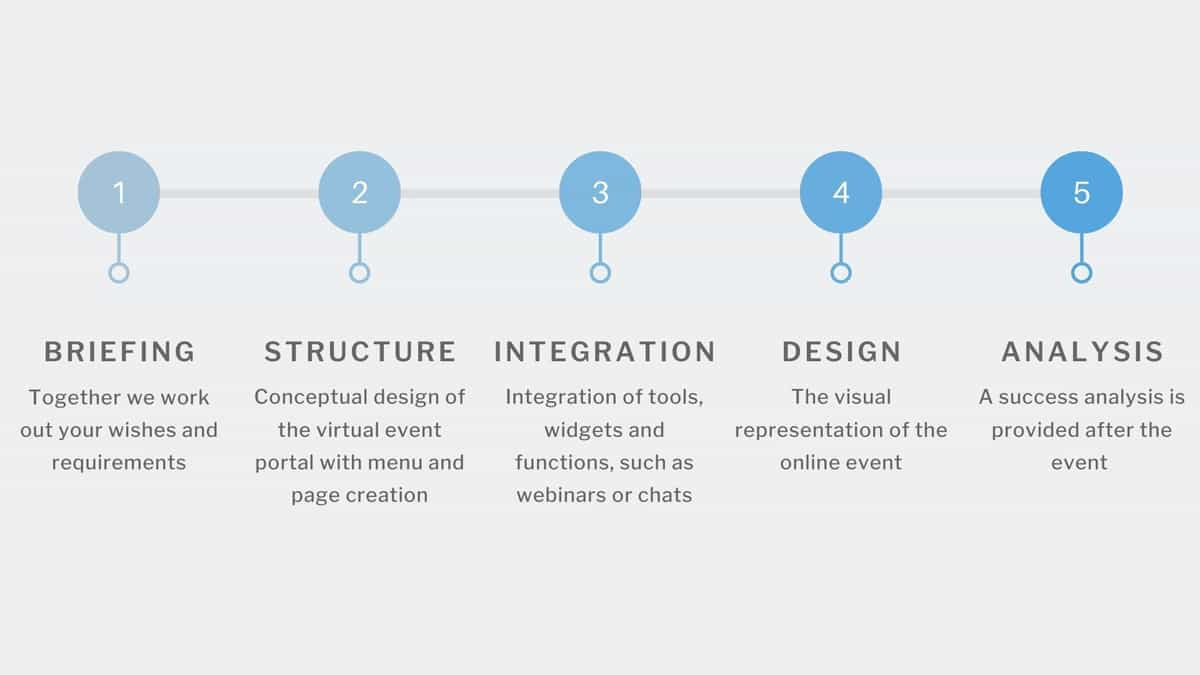Content integration
You can include many different content elements
Software solution for your virtual event
The virtual event platform gives you the opportunity to make your virtual trade fairs and events available to your participants and users. You can easily send invitations for the events via the platform.
The virtual event platform is especially suitable for companies without their own CMS and CRM system. All modules can be combined and work together, no further interface is required for the implementation and the modules are regularly renewed and updated in their functions.

With the virtual event platform solution, you get the following modules for the implementation of your virtual events:
The CMS, i.e. Content Management System, is the basis for all content.
The presentation of all virtual events takes place online on Internet pages. To create and manage them individually, a powerful CMS is required.
A CRM (customer relationship management) system is required to generate leads and analyze the customer journey.
However, this CRM system must not be detached, but must be able to connect with all elements of the reference framework. Only in this way can the data from all elements be connected and used in a meaningful way. The event CRM is thus at the center of the framework.
The central difference between virtual events and "normal websites" is the presentation of spatial contexts. Physical trade fairs and events differ from alternative content offerings in their presentation in space.
In order to "mimic" this experience online (other possibilities do not currently exist), the representation of interactive spatial experiences is required. Therefore, the framework must include a solution for virtual environments.
Another special feature of virtual events compared to "normal website visitors" is the interaction of the participants - i.e. the formation of a group of people participating in a virtual event.
For this reason, it is necessary to integrate appropriate functionalities for the formation of these groups and the interaction "of these and with these" into the framework. This task is performed in the framework by module 4: "Event and participant management".
Compared to the analog world, many interactions can be automated in the digital world. This advantage of the digital world should be used for virtual events (after all, it's about the symbiosis of the strengths of both worlds). In the digital world, the marketing automation approach is used for this purpose. This approach is therefore transferred to virtual events as an element of the reference framework.
Closely linked to marketing automation is the topic of event analytics, i.e. the statistical and analytical processing of the event and visitor behavior. Even in the "pure, digital" world, these tasks are therefore mostly combined in one software module.
You can include many different content elements
Content tailored specifically to your visitor
Promote interaction with chats, video calls and surveys
Operating options for users of mobile devices
The platform offers numerous quantitative evaluations
The visitor's customer journey is tracked
Get more information about the virtual event platform and get advice.
To provide holistic solutions for your virtual event, we have aligned our solutions to the AMICO model. The AMICO model defines the requirements for a virtual event platform for the long-term use of virtual events in the entire customer journey. Our platform solutions are additionally certified according to the VEP-RF.


For customers with their own CRM and CMS system, the VirtualShow PlugIn (Module 3) is an option, which was also built in coordination with the AMICO model and is VEP-RF compliant.
